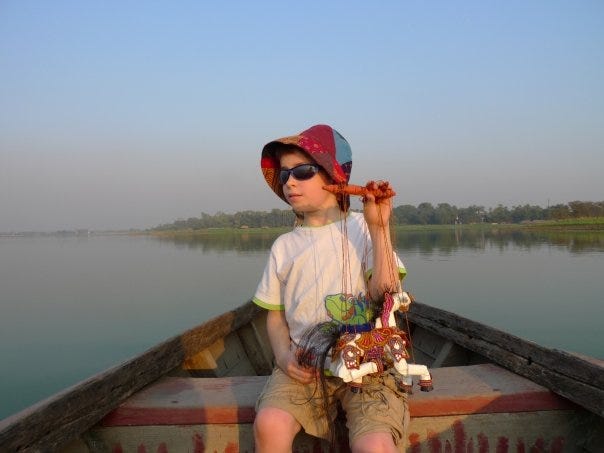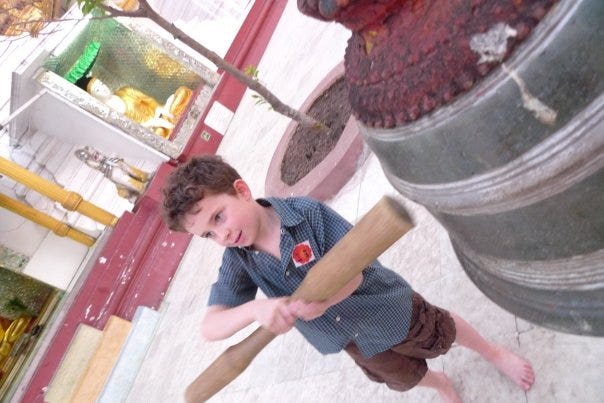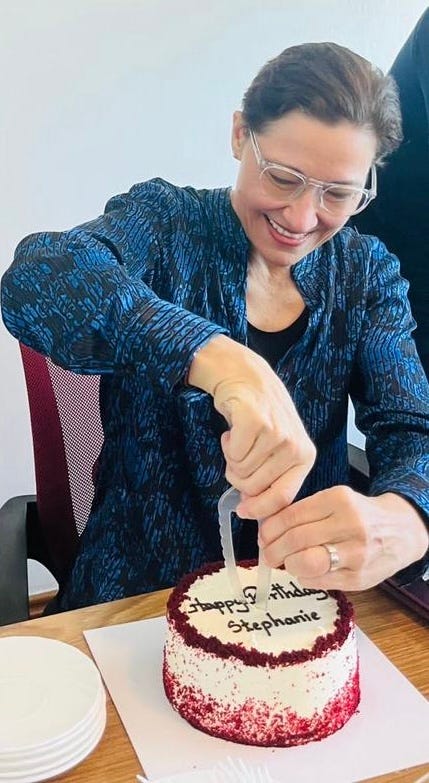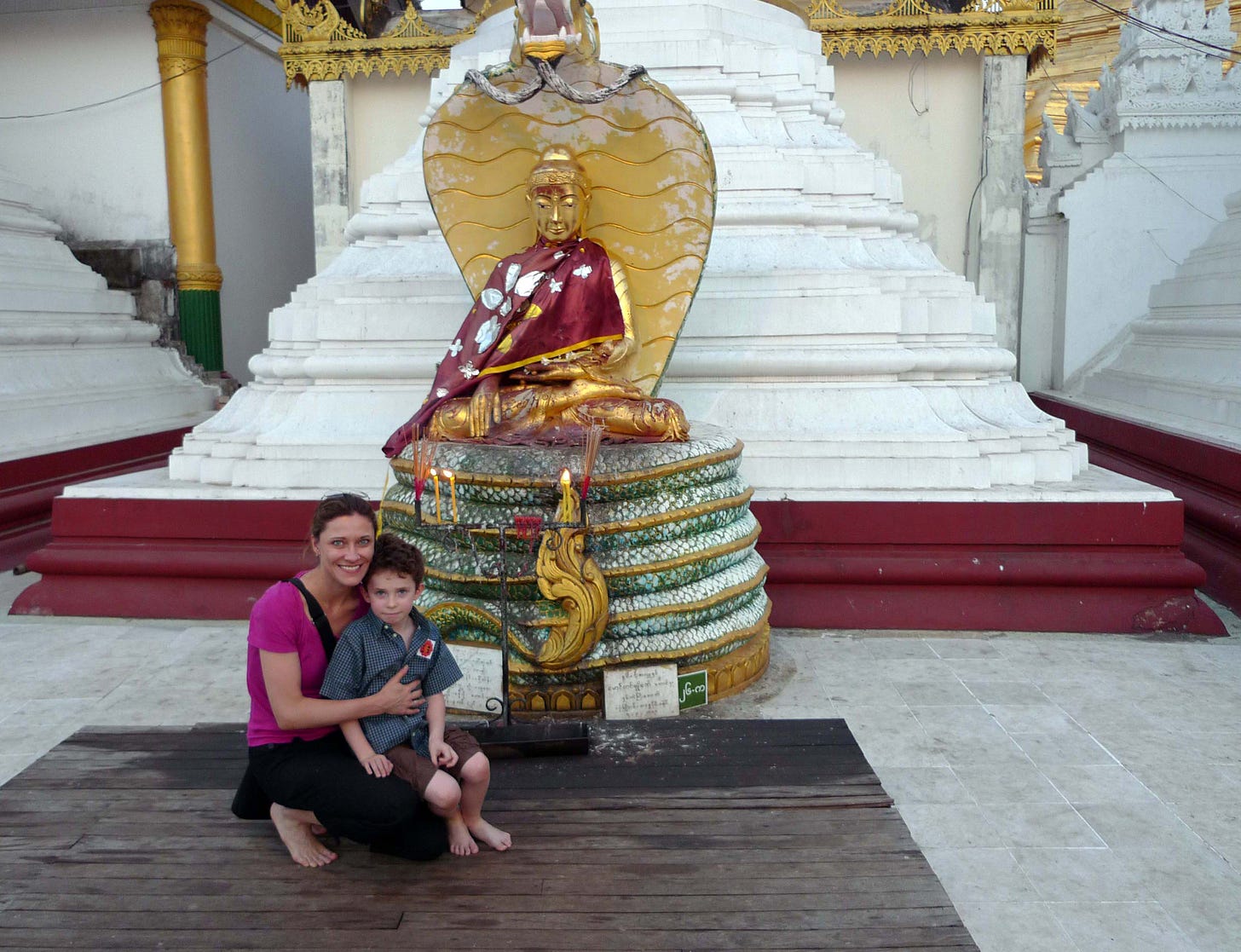En route to Myanmar, with more than 20 hours in the air and 12 on the ground in layovers, I turned to writing—both to pass the time and to make sense of it. I found myself reflecting on my last visit in November 2022, and on the jarring contrast between the political moment I was leaving behind—another presidential race between two aging white men, one openly hostile to democratic norms—and the fierce, often life-risking fight for democracy I’ve witnessed in other corners of the world.
A History of Struggle and Resilience
Here in Myanmar, the struggle for democracy has always carried a sense of urgency—real, lived, and urgent. And yet, at every turn, people face obstacles that seem designed to wear them down.
A Decade of Visits and Deepening Engagement
Since 2006, I’ve had the chance to visit Myanmar eight times, working in different capacities with the Council on Foreign Relations, International Crisis Group, U.S. Institute of Peace, the United Nations, and now with the International Legal Foundation. Over the years, I’ve written extensively about the country—often focusing on the military’s enduring violence against ethnic communities and the growing reach of China’s influence. (For example, see here, here and here).
From that first visit, I was struck—not just by the weight of the challenges—but by the resilience, spirit, and determination of the people who live them every day.
Despite decades of authoritarian rule—from General Ne Win’s 1962 coup to the violent crackdown in 1988, and the renewed repression following the 2021 military takeover—the spirit of the people remains remarkably unbroken.
Photos often say more than words can, so I’ve included a slideshow of images from my travels across this complex, beautiful country. I brought Adrian here as soon as he was old enough to take it in—to witness not just the history, but the heart of a place that has left a deep imprint on mine.

In recent years, Myanmar’s crises have included genocide and ethnic cleansing, most notably against the Rohingya Muslims. Around two million people have been displaced, with many forced into what is now the world’s largest refugee camp in Cox’s Bazar, Bangladesh. At the same time, other ethnic communities—including the Karen, Kachin, Shan, and Chin—have endured decades of state violence and human rights abuses at the hands of the military.
Since the February 2021 coup, the military’s brutal crackdown has expanded, targeting not only ethnic minorities but also the broader population rising up against authoritarian rule. The result has been widespread human rights violations, indiscriminate killings, the destruction of homes and villages, and a deepening humanitarian crisis across the country.
Justice Work Amid Collapse
In November 2022, with my cancer stabilized on chemotherapy, I returned to Myanmar to support the lawyers fighting on the front lines of justice—for protestors, ethnic minorities, minors, displaced people, and detainees held without representation. I hadn’t seen these brave souls since February 2020 in Yangon, just before COVID swept the region. Back then, I handed them the last boxes of N95 masks I could find—bought at a Home Depot in Los Angeles, not knowing how much we’d all soon be needing them.
Returning Amidst Tumultuous Times
During that late 2022 visit, I returned to a country unraveling. Roadblocks, bombings, arson, and violent clashes between the military, resistance forces, and ethnic groups had become part of daily life. Inflation was soaring, curfews were in place, and theft and looting were on the rise.
The lawyers I was therel to support were operating under immense pressure. They and their staff faced constant harassment, phone confiscations, and growing threats—especially when representing Rohingya clients, whose cases carried heightened risk in an already volatile landscape.
Despite these formidable hurdles, the lawyers were playing an even more critical role than before the coup. With families and social services barred from visiting, they had become the only people legally allowed to enter the prisons and see detainees. Working within a holistic legal aid model, they partnered with social workers to provide more than just legal representation. They also delivered food, medicine, clothing, and other essentials—often becoming the sole lifeline for those behind bars.
The Role of Legal Aid Lawyers in a Fractured Judicial System
Amid a deepening national crisis—widespread human rights abuses, entrenched corruption, and daily threats—these lawyers held firm to the principle that every person deserves a fair trial. Their commitment ran deep. They crafted new legal strategies to push back against the regime’s escalating use of anti-terrorism laws to silence dissent. Their professionalism and integrity were so consistent that court clerks eventually stopped trying to solicit bribes from them.
But that same integrity came at a cost. Refusing to play by the system’s corrupt rules often meant delays in accessing crucial documents and more friction at every step of the process.
As I immersed myself more deeply in the work, I came to see that these lawyers brought not only integrity, dedication, and professionalism—but also remarkable skill in navigating the extreme pressures they faced. Their resilience showed up in various ways: limiting exposure to distressing social media, practicing compassion and mindfulness, leaning on strong bonds with colleagues and friends, and working collaboratively to solve the challenges that arose each day.
Strategies for Coping and Resilience
When I asked them to rate their stress on a scale from 1 to 10—a question that typically draws an 8 or 9 from similar teams in the U.S. or Europe—not one of them rated it higher than a 5. The reasons are likely complex and shaped by culture, but also speak to the skillful ways they manage the weight of their work.
Together, we established foundational principles through individual and group coaching, focusing on how to navigate leadership challenges, communicate effectively, and strengthen teamwork under pressure. I also delivered a resilience training—an early version of the one I later conducted in the West Bank—drawing on research in neuroscience. This work reinforces a simple but powerful truth: resilience is not a trait we’re born with, but a set of skills that can be cultivated.
The highly experiential training was designed to help participants cultivate beneficial behaviors, mental habits, and micro-practices that enhance personal resilience and foster a resilient culture within their teams and organization.
Engaging deeply with the personal stories of the lawyers and their staff—and exploring the strategies they’ve developed to survive under such pressure—was profoundly humbling. Their accounts were not just reflections of hardship, but powerful testaments to courage and determination. In them, I recognized the same resilient resilient spirit I've encountered in other conflict zones: steady, unflinching, and quietly fierce.
Through their stories, certain universal themes emerged: a deep commitment to justice, an extraordinary ability to endure, and a quiet, unwavering pursuit of hope—even in the darkest moments. Many shared harrowing accounts of loved ones who had been incarcerated or mistreated. Holding space for the pain behind these experiences—and helping process the emotions they carried—was the most challenging part of the work..
Celebrating Amidst Chaos
My birthday happened to fall during the visit, and the staff generously organized a lively celebration—complete with cake and an impressive spread of pizzas. I eagerly bit into a slice, only to be met with the strange fusion of American cheesy crust and a sweet, distinctly Asian flavor. It made me pause: even in the most unexpected corners of the world, some of the least inspiring aspects of U.S. culture manage to leave their mark.
What stayed with me after my 2022 trip to Myanmar wasn’t just the violence or the instability—it was the people who kept showing up. The lawyers I worked with weren’t just practicing law in a broken system; they were holding a line that few others could. Quietly, and often at personal risk, they did what they could: visited prisons, stood beside clients no one else would touch, and leaned on each other when the system offered no support.
They worked without headlines or recognition. Some had family members in jail. Others had been threatened themselves. And still, they kept going—not because they believed they could fix it all, but because they believed in what they were doing.
I’m back in Myanmar now for two weeks, visiting offices across the country, listening, learning, and doing what I can to support their work. Being with them again reminds me what resilience actually looks like. Not a word in a training or a chapter in a book, but a way of moving through impossible situations—together, with care and resolve.
Compared to their daily lives, my own challenges feel minor—less like a battle, more like a practice. Cancer has brought its own demands, but sitting with these lawyers reminds me that uncertainty is everywhere, and it’s not something to resist. It’s something to move with.
I’ll be home soon, maybe with more stories. But even now, I know I’m returning changed. Their example stays with me
Postscript: A Call to Support Legal Aid in Conflict Zones
I established a legacy fund to support these lawyers from the International Legal Foundation worldwide because, despite the crucial nature of their work, it often doesn't receive the same level of attention or funding as more visible causes like aiding refugees or combating hunger. Securing donations for legal aid in places like Myanmar and Afghanistan remains extraordinarily challenging, even with the urgent need. In these regions, the U.S. has completely withdrawn assistance, and other donors have followed suit. There must be a better way to support populations in civil war zones or under oppressive military regimes. Public defender offices are like emergency rooms for victims of fundamental human rights violations. They act as sanctuaries for the most vulnerable and underprivileged who struggle to navigate a complex justice system while seeking essential assistance.
These lawyers, social workers and their staff tirelessly under conditions that are difficult for most of us to imagine. They face constant threats, harassment, and the ever-present risk of violence, alongside challenges like spiraling inflation and frequent power cuts—all while striving to uphold justice and human rights. They are not just fighting individual cases but challenging systems that perpetuate oppression and inequality. Their efforts ensure that the voices of the marginalized are heard and that the rule of law is upheld in the most fragile environments.
Moreover, in a world where the struggle for democracy and human rights is increasingly global, their work transcends their own countries. It sets a precedent for justice everywhere. By supporting these advocates, we are investing in a future where human rights are universally respected and protected.
Adrian proudly wearing his Obama T-shirt (talking about him to whomever would listen!) Mandalay Hill, Feb 2009








